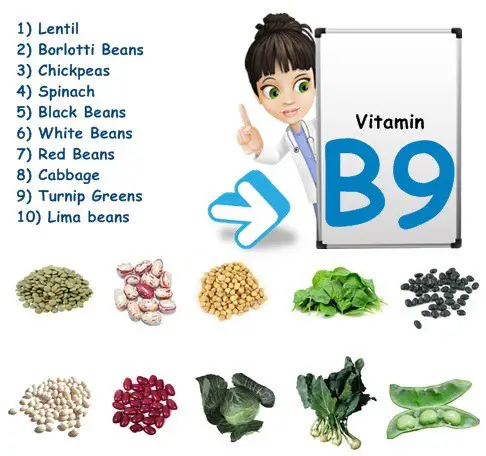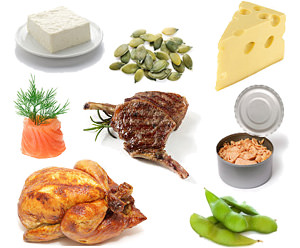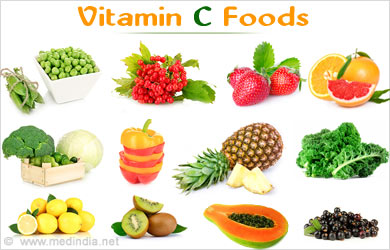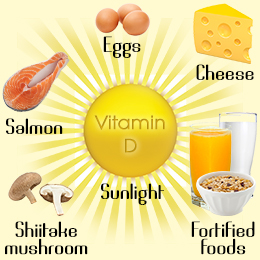Vitamins: Their functions, deficiency
symptoms and natural sources
What are vitamins?
Vitamins
are organic compounds that are necessary for overall health and general
well-being. These vital nutrients have diverse biochemical functions. Vitamins
are classified by their biological and chemical activity, not by their
structure.
Here is a brief overview of various
functions of vitamins, symptoms of their deficiency and their natural sources.
- Vitamin A
Functions of vitamin A
Vitamin A (retinol, retinal and four
carotenoids including beta carotene) is a fat soluble vitamin. It performs many
functions in the human body. It promotes growth and development of the body. It
maintains the immune system. It is very important for healthy eyes.
Medical conditions caused by
vitamin A deficiency
Deficiency of vitamin A causes impaired
vision, particularly in reduced light. This condition is commonly known as
night blindness. Hyperkeratosis, thickening of the stratum corneum (outermost
layer of the epidermis) is another condition caused by vitamin A deficiency.
You notice white lumps at hair follicles. Deficiency of vitamin A also causes
keratomalacia, an eye disorder.
Natural sources of vitamin A
Ripe
yellow fruits, carrot, orange, paprika, squash, red pepper, leafy vegetables,
cayenne, pumpkin, chili powder, spinach, soy milk and sweet potatoes are some
natural sources of vitamin A.- Vitamin B1
Vitamin B1 (thiamine) is a water soluble
vitamin. This means the human body does not store this vitamin. Vitamin B1
plays a significant role in the healthy functioning of the nervous system. It
strengthens the immune system and helps the body cope with stress.
Medical conditions caused by
vitamin B1 deficiency.
Vitamin
B1 deficiency causes beriberi, Wernicke-Korsakoff syndrome, cataracts and
Alzheimer’s disease. It may also cause heart failure. Excessive consumption of
alcohol flushes vitamin B1 out.
Natural sources of vitamin B1
Whole grains, enriched cereals, brown rice,
sesame seeds, sunflower seeds, dried herbs and spices, pine nuts, pistachios,
macadamia nuts, pecans, legumes, wheat germ, bran, brewer’s yeast and
blackstrap molasses are some natural sources of vitamin B1.
- Vitamin B2
Functions of vitamin B2
Vitamin B2 (riboflavin) is a water soluble
vitamin. It is necessary for proper functioning of cells. It plays an important
role in energy metabolism. It is required for metabolism of carbohydrates,
proteins, ketone bodies and fats.
Medical conditions caused by
vitamin B2 deficiency
Vitamin B2 deficiency affects the digestive
system. The person may experience dizziness frequently, hair loss, skin rashes,
eye problems and insomnia. Slow mental response is another common symptom of
vitamin B2 deficiency. Ariboflavinosis is another medical condition caused by
deficiency in this vitamin.
Natural sources of vitamin B2
Banana, dried herbs, asparagus, almonds,
wheat bran, dried spices, green beans, sesame seeds, dried roasted soybeans,
sun dried tomatoes, dried peppers and pop corn are some natural sources of
vitamin B2.

- Vitamin B3
Functions of vitamin B3
Vitamin B3 (niacin and niacinamide) is a
water soluble vitamin. It plays a major role in conversion of carbohydrates to
glucose. It is important for normal cellular growth and division. It repairs
damaged DNA.
It plays a significant role in normal production of sex hormones
and stress hormones.
Medical conditions caused by
vitamin B3 deficiency
Vitamin B3 deficiency causes pellagra.
Diarrhea, dermatitis, dementia, aggression, red skin lesions, insomnia,
weakness, confusion, ataxia and dilated cardiomyopathy are some common symptoms
of this medical condition. Pellagra can cause death.
Natural sources of vitamin B3
Rice bran, wheat bran, paprika, peanuts,
sun dried tomatoes, vegetables, mushrooms and tree nuts are some natural
sources of vitamin B3. It is definitely advisable to include them in your daily
diet.
Broccoli is an excellent natural source of vitamin B3.
Vitamin B5
Functions of vitamin B5Vitamin B5 (pantothenic acid) is a water soluble vitamin. It plays a major role in the manufacture of red blood cells (RBC). It helps in breakdown of fats and carbohydrates in the body.Medical conditions caused by vitamin B5 deficiency.Vitamin B5 deficiency causes paresthesia. First sign of vitamin B5 deficiency is burning sensation in the hands and feet. Muscle crams, numbness, tingling sensation, irritability, fatigue, tiredness, apathy, diarrhea, vomiting, sleep disturbance and restlessness are other symptoms of vitamin B5 deficiency.Natural sources of vitamin B5Broccoli, wheat bran, avocado, rice bran, sunflower seeds, whey powder, mushrooms, cheese, corn, broccoli, caviar, sun dried tomatoes, squash and fish are some foods that are rich in vitamin B5.

Vitamin B6
Functions of vitamin B6Vitamin B6 (pyridoxine, pyridoxamine and pyridoxal) is a water soluble vitamin. It is involved in many aspects of macronutrient metabolism. It plays a significant role in amino acid metabolism, gluconeogenesis and lipid metabolism.Medical conditions caused by vitamin B6 deficiencyAnemia and peripheral neuropathy are caused by deficiency in vitamin B6. Inflammation of the skin, sore tongue, depression, cognitive problems and convulsions are some symptoms associated with vitamin B6 deficiency.Natural sources of vitamin B6Tree nuts, dried spices, wheat bran, sesame seeds, bananas, rice bran, dried herbs, pistachios, raw garlic, sunflower seeds, molasses, sorghum syrup, filberts and hazelnuts are some natural sources of vitamin B6.

- Vitamin B7
Functions of vitamin B7
Vitamin B7 (biotin) is a water soluble
vitamin. Also known as vitamin H, this nutrient is a coenzyme for carboxylase
enzymes, involved in synthesis of valine, fatty acids and isoleucine. It is
also involved in gluconeogenesis.
Medical conditions caused by vitamin
B7 deficiency
Dermatitis and enteritis are medical
conditions that are caused by deficiency in vitamin B7. Hair loss, fatigue,
depression, nausea, muscle pains and anemia are some signs of vitamin B7
deficiency.
Natural sources of vitamin B7
Oil-roasted peanuts, oil-roasted sunflower
seed, soy beans, dried yeast, nuts, oatmeal, walnuts, baker’s yeast, mustard
powder, salted peanut, salted sunflower seeds, salted hazelnuts, dried peanuts,
instant coffee, oil-roasted hazel nuts and green laver are some good sources of
vitamin B7.

- Vitamin B9
Functions of vitamin B9
Vitamin B9 (folic acid and folinic acid) is
a water soluble vitamin. It helps in conversion of carbohydrates into glucose.
It is very much necessary for the proper functioning of the brain. It promotes
healthy skin, eyes, hair and liver. It aids in the production of DNA and RNA.
Medical conditions caused by
vitamin B9 deficiency
Magaloblastic anemia, heart problems,
age-related hearing loss, age related macular degeneration, depression, cancer,
neural tube defects and other birth defects are caused by vitamin B9
deficiency.
Natural sources of vitamin B9
Leafy vegetables, pasta, bread, cereal,
spinach, dark leafy greens, asparagus, turnip, beets, mustard greens, Brussels
sprouts, lima beans, soybeans, brewer’s yeast, root vegetables, whole grains,
wheat germ, bulgur wheat, kidney beans, white beans, mung beans, orange juice
and avocado are some sources of vitamin B9.

- Vitamin B12
Functions of vitamin B12
Vitamin B12 (cyanocobalamin,
hydroxycobalamin and methylcobalamin) is a water soluble vitamin. It works with
folate in making body’s genetic material. It is necessary for the production of
red blood cells. It also keeps the amino acid homocysteine in check.
Medical conditions caused by
vitamin B12 deficiency
Vitamin B12 deficiency causes megaloblastic
anemia and heart problems. Weakness, rapid breathing, tiredness, light
headedness, rapid heartbeat, pale skin, sore tongue, weight loss and diarrhea
are some symptoms of vitamin B12 deficiency.
Natural sources of vitamin B12
Clams, oysters, mussels, liver, caviar,
octopus, fish, crab, lobster, beef, beef, mutton (especially shoulder), cheese
(especially Swiss cheese) and eggs (raw yellow) are good sources of vitamin
B12.

- Vitamin C
Functions of vitamin C
Vitamin C (ascorbic acid) is a water
soluble vitamin. This essential nutrient is a cofactor in at least eight
enzymatic reactions, including several collagen synthesis reactions that, when
dysfunctional, cause the most severe symptoms of scurvy.
Vitamin C promotes heaving of wounds and
prevents bleeding from capillaries. It is an excellent antioxidant and prevents
many harmful medical conditions. It is required for many metabolic reactions.
Medical conditions caused by
vitamin C deficiency
Vitamin C deficiency causes scurvy.
Fatigue, mood swings, joint pain, dry skin, weight loss, bruising, muscle pain,
dental conditions, dry hair and infections are some signs of vitamin C
deficiency.
Natural sources of vitamin C
Red hot chili peppers, guava, green hot
chili peppers, bell peppers, fresh herbs (like thyme and parsley), dark leafy
greens (like garden cress, kale and mustard greens), broccoli, cauliflower,
Brussels sprouts, kiwi fruits, papaya, strawberries, oranges and clementines
are very good sources of vitamin C.

- Vitamin D
Functions of vitamin D
Vitamin D (cholecalciferol) is a fat
soluble vitamin. It plays a major role in maintaining strong and healthy bones.
It promotes absorption and use of calcium and phosphates for healthy bones and
teeth.
Medical conditions caused by
vitamin D deficiency
Vitamin D deficiency causes rickets and
osteomalacia. People with deficiency in this vitamin are more likely to be
affected by cardiovascular diseases and cancer. Older adults may suffer from
cognitive impairment. Children with vitamin D deficiency may be affected by
severe asthma.
Natural sources of vitamin D
Sunlight is an excellent source of vitamin D.

- Vitamin E
Functions of vitamin E
Vitamin E (tocopherols and tocotrienols) is
a fat soluble vitamin. It is an antioxidant and stops the production of
reactive oxygen species formed when fat undergoes oxidation in the body.
Medical conditions caused by
vitamin E deficiency
Vitamin E deficiency is very rare. It may
cause mild hemolytic anemia in newborn infants. Spinocerebellar ataxia,
myopathies, peripheral neuropathy, ataxia, skeletal myopathy and retinopathy
are other conditions caused by vitamin E deficiency.
Natural sources of vitamin E
Corn oil, sunflower seeds, paprika, soybean
oil, margarine, safflower oil, wheat germ oil, sunflower oil, red chili powder,
cooked taro root, almonds, pine nuts, peanuts, dried herbs (like basil and
oregano), dried apricots, pickled green olives and cooked spinach are rich in
vitamin E.

- Vitamin K
Functions of vitamin K
Vitamin K (phylloquinone and menaquinones)
is a fat soluble vitamin. Human body needs this vitamin for posttranslational
modification of certain proteins required for blood coagulation. It promotes
healthy bones and tissues.
Medical conditions caused by
vitamin K deficiency
Deficiency in vitamin K causes bleeding
diathesis. Newborn infants are more likely to be affected by vitamin K
deficiency.
Natural sources of vitamin K
Dried herbs, prunes, pickled cucumber, dark
leafy herbs, fresh herbs, spring onion, Brussels sprouts, broccoli, chili
powder, curry, paprika, cayenne, asparagus and cabbage are natural sources of
vitamin K.
Many vitamin supplements are available in
the market. However, it is always advisable to obtain vitamins from their
natural sources. Including foods rich in vitamins in your daily diet ensures
good health.

Looking and feeling younger begins from the inside out.The healthy food you eat should not only satify your appitite,but should also be a part of skin care routine



No comments:
Post a Comment